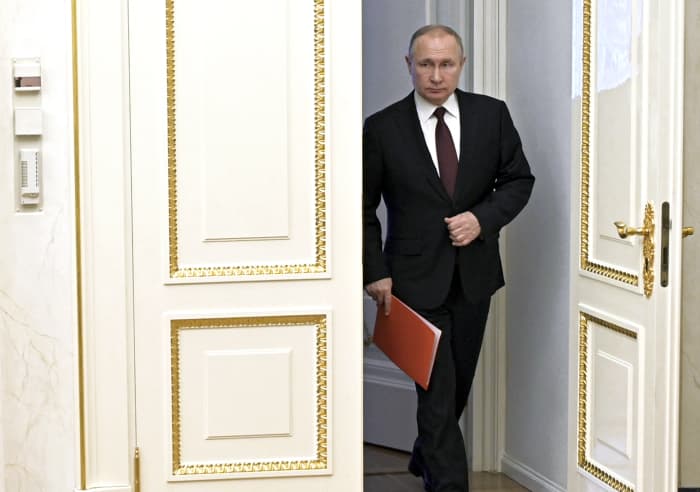Putin ordena poner en alerta a fuerzas nucleares tras declaración de OTAN / Putin orders nuclear forces to high alert in response to ‘aggressive statements’ by NATO powers
MOSCÚ.- El presidente de Rusia, Vladímir Putin, ordenó hoy poner las fuerzas de contención rusas en «régimen especial de servicio» tras «declaraciones agresivas» de los principales países de la OTAN.
«Los más altos cargos de los principales países de la OTAN se permiten declaraciones agresivas en contra de nuestro país, por eso ordeno al ministro de Defensa y al jefe del Estado Mayor poner las fuerzas de contención del Ejército ruso en régimen especial de servicio», dijo.
El mandatario ruso dio estas instrucciones en una reunión con el ministro de Defensa ruso, Serguéi Shoigú, y el jefe del Estado Mayor de las Fuerzas Armadas, Valeri Gerásimov.
Putin subrayó que Occidente da pasos inamistosos respecto a Rusia desde el punto de vista económico.
«Me refiero a las sanciones ilegítimas bien conocidas por todos», agregó, en referencia al vendaval de sanciones occidentales impuestas a Rusia tras su invasión a Ucrania, que el Kremlin denomina «operación militar especial» de «desmilitarización y desnazificación» del país vecino».
EFE

Putin orders nuclear forces to high alert in response to ‘aggressive statements’ by NATO powers
KYIV, Ukraine — In a dramatic escalation of East-West tensions over Russia’s invasion of Ukraine, President Vladimir Putin ordered Russian nuclear forces put on high alert Sunday in response to what he called “aggressive statements” by leading NATO powers.
The order means Putin wants Russia’s nuclear weapons prepared for increased readiness to launch and raises the threat that Moscow’s invasion of Ukraine and the West’s response to it could boil over into nuclear warfare.
Amid the worrying development, the office of Ukraine’s president said a delegation would meet with Russian officials as Moscow’s troops drew closer to Kyiv.
Putin, in giving the nuclear alert directive, cited not only the alleged statements by NATO members but the hard-hitting financial sanctions imposed by the West against Russia, including the Russian leader himself.
Speaking at a meeting with his top officials, Putin told his defense minister and the chief of the military’s General Staff to put the nuclear deterrent forces in a “special regime of combat duty.”
“Western countries aren’t only taking unfriendly actions against our country in the economic sphere, but top officials from leading NATO members made aggressive statements regarding our country,” Putin said in televised comments.
Putin threatened in the days before Russia’s invasion to retaliate harshly against any nations that intervened directly in the conflict in Ukraine, and he specifically raised the specter of his country’s status as a nuclear power.
The U.S. ambassador to the United Nations responded to the news from Moscow while appearing on a Sunday news program.
“President Putin is continuing to escalate this war in a manner that is totally unacceptable,” Ambassador Linda Thomas-Greenfield said. “And we have to continue to condemn his actions in the most strong, strongest possible way.”
The practical meaning of Putin’s order was not immediately clear. Russia and the United States typically have the land- and submarine-based segments of their strategic nuclear forces on alert and prepared for combat at all times, but nuclear-capable bombers and other aircraft are not.
Published: Feb. 27, 2022 at 9:50 a.m. ET
Associated Press


 (1) (2).jpg)

